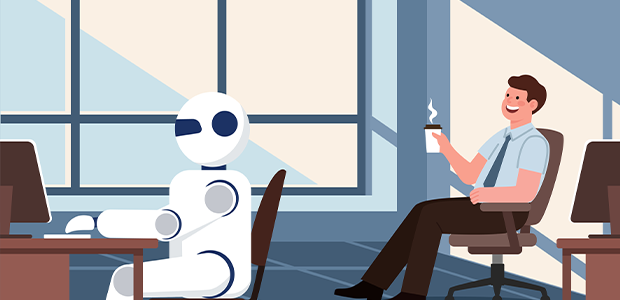
AI’s mixed impact on work
The Adecco Group has announced the release of its sixth annual Global Workforce of the Future report, titled Humanity at work: How to thrive in the AI era. The report uncovers how AI, purpose, and human connection are reshaping work – and what leaders should do to keep pace amid workforce transformation.
Drawing on insights from 37,500 workers across 31 countries and 21 industries, the report reveals that as AI tools and agents gather pace, workers say they are saving an average of two hours per day. These perceptions of productivity gains are at odds with the reality experienced by many organisations, which suggests a disconnect.
Among the key findings, the Adecco Group’s research detects that employees view AI as a defining force at work in 2025, overtaking economic uncertainty and flexible working as the top workplace influence. Additionally, confidence in AI usage has surged, with a staggering 71% of respondents suggesting that nothing holds them back from using AI, a significant jump from 19% in 2024.
Key findings of the Global Workforce of the Future report:
- AI expands capabilities: more than three-quarters of employees say AI enables them to perform tasks previously out of reach, and nearly three-quarters report that AI has already changed or will soon change the skills and activities required in their roles
- Uncertainty remains: while 76% anticipate AI will create new jobs and 70% expect job re-architecture, 23% fear job loss and seek reassurance
- Purpose and trust are critical pillars: workers who understand how AI affects their role – and how their work connects to company strategy – are far more likely to stay, even as privacy concerns climb to 44%
- Future-ready workforce sees sharp growth: 37% of workers are future-ready in 2025, more than triple last year’s 11%
Commenting on the findings, Denis Machuel, Chief Executive Officer of the Adecco Group, said: “AI is now a daily reality with workers’ optimism about its potential increasing. However, technology in itself is not enough to drive change – people remain at the heart of every transformation. To turn efficiency into business impact, leaders must also invest in training and engagement to unlock value. Organisations must ensure that employees have the confidence and know-how to engage meaningfully with AI. When used strategically, AI can be powerful and ultimately empowers individuals, strengthens trust and creates better work environments for everyone.”
The future-ready worker
The research further highlights that ‘future ready’ workers – those proactively upskilling and adapting to new technologies – are benefiting from clearer objectives and skills-based career support. “Future-ready workers thrive when they have clarity, measurable goals, and continuous learning opportunities,” added Daniela Seabrook, Chief HR Officer of the Adecco Group. “Employers must provide the right tools, training and ethical frameworks so that AI becomes a driver of growth and human potential – not a source of uncertainty.”
While optimism is high, uncertainty remains. While 76% anticipate AI will create new jobs and 70% expect job re-architecture, 23% fear job loss and seek reassurance. Seabrook comments: “To build a truly future-ready workforce, employers must provide clarity on how roles will evolve, and which skills will matter most.”
Despite the time saved through AI, the report found that one-third of workers spend that time on the same or more mundane tasks. To channel this efficiency into engagement, employers must help workers measure the impact of their work and transition to more meaningful, value-adding tasks.
Purpose and career development drive retention
Findings indicate that a clear sense of purpose is a powerful factor retaining talent. Workers who understand how their role contributes to company strategy are significantly more loyal: 99% of those who feel a strong sense of purpose every day plan to stay for the next 12 months, compared to just 53% who never feel it. Career development is also a growing priority; one in three workers would stay with their employer if offered clear progression opportunities – up from 22% last year.
Trust and human connection in an AI-driven world
Workers welcome AI for automation and training but still prefer human judgment for sensitive career decisions. The report found that leaders and managers are more comfortable with AI agents than entry-level staff, highlighting the need for transparent communication and ethical guardrails. Future ready workers who have a strong understanding of their impact and take ownership of their skills development, trust AI more than their peers, demonstrating that clarity and involvement are key to building confidence.
Machuel adds: “Organisations must understand that AI adoption is no longer optional – it is a strategic imperative. Investing in transparent governance, ethical frameworks and continuous upskilling is the only way to unlock sustainable productivity gains while maintaining trust. All this must be carried out with people at the heart of the strategy. As the workplace continues to evolve, collaboration between employers and employees, empowered by technology, will be key to building a resilient and future-ready workforce.”
For more startup news, check out the other articles on the website, and subscribe to the magazine for free. Listen to The Cereal Entrepreneur podcast for more interviews with entrepreneurs and big-hitters in the startup ecosystem.

